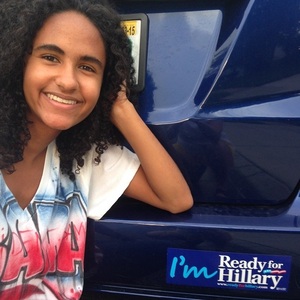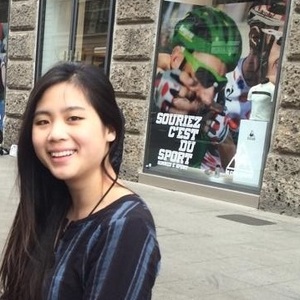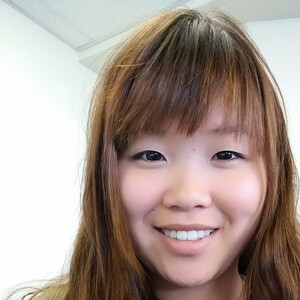Question young, first-time voters about whom they will be supporting in the 2016 presidential election — via a callout on NPR's Facebook page — and you will receive more than 700 all-over-the-map responses.

Danielle Mikell
Some thoughtful, some insightful. And a heck of a lot filled with what can only be called Hillary Exhilaration.
Especially among the young women of Generation Z — cultural shorthand for the cohort born in the mid-'90s or later.
"I wanted Hillary Clinton to win in the 2008 Democratic primary," says Danielle Mikell, 19, Of Orlando, Fla., referring to the former secretary of state/New York senator/first lady. "I am so excited to vote for her hopefully in the 2016 election that I got an 'I'm Ready for Hillary' bumpersticker for my first car."
Sali Yi, 18, who is at Harvard, Class of 2018, says, "I am ready for Hillary! I spent a good chunk of my junior year of high school in 2012 phonebanking for President Obama — making a thousand-plus calls — and I cannot wait to campaign, and vote, for Hillary Clinton if she decides to run."
First Ballots
Political scientist Virginia Sapiro of Boston University is not a fan of labeling generations. "There's just no good social science evidence," she says, "that helps us understand what's going on. Experience and individual development are continuous."

Sali Yi
However, she says, "the major formative impacts on people's political views tend to come from the influences of their families and social context, and the particular impacts of their late adolescence and early adulthood. So after the fact — it did make a difference whether people were entering the political arena as voting-aged people during the New Deal or the turmoil of the late '60s or the Reagan Revolution or the first Obama election."
Some young respondents to NPR's callout were not head over heels for Hillary. Lauren McKinley, 18, of Houston, tells NPR that she is "very excited to finally be able to vote. In previous years, discussing the platforms of candidates with friends has felt relatively futile because I knew I would not be able to express the opinions I had cultivated." Lauren describes herself as a moderate Republican and is very interested to see who her party picks to run. "If it was me, I'd pick Rand Paul," she says. Others mentioned Chris Christie and Marco Rubio as Republican candidates they might cotton to.
On some college campuses, the enthusiasm is evident. "I have been following Hillary Clinton's book tour, and I am eagerly awaiting her decision to run in the 2016 election," says Emily Kazmierski, 18, a computer engineering student at Rochester Institute of Technology in Rochester, N.Y.

Emily Kazmierski
"Students for Obama was huge," Hillary Clinton campaign organizer Rachel Schneider tells MSNBC, "and I think that Students for Hillary will be just as big, if not end up being bigger." Favorability is a fact: Among young American women, Hillary Clinton's favorable rating is 57 percent, and among Democrats it is 80 percent, according to a recent Harvard survey.
Making Herstory
And there is among many of the young women who responded to NPR's Facebook callout another driving force — the possibility of breaking new ground by electing the first female president in United States history.
Daria Prasad, 17, of Kings Park, N.Y., says, "As a person of mixed race, I was delighted to have Obama as my president. I don't know for sure who the candidates will be in 2016, but I am looking forward to electing the first female president."
Maggie Lingner, 16, of Minneapolis, says, "I would be overjoyed to vote for the possible first female president. That would be really, really cool. If she won, it would mean a lot to me and would be a big step for creating a more equal world as far as gender goes."
And Emily Wingenroth, 18, of Asheville, N.C., observes, "I don't know very much about the potential candidates, but right now I'm thinking about Hillary Clinton."
Because, she adds, "I think it's about time we had a female president."
Not So Fast
Again, political scientist Virginia Sapiro sounds a cautionary note. She is not sure that the chance to make history will translate into a bigger turnout.
"We have had so many potential 'history-making' candidates throughout history," she says, recalling how she voted for eventual loser George McGovern in 1972 instead of the pioneering African-American female candidate Shirley Chisholm.
Some voters may want to make history by rallying around a certain person, she says, but a much bigger driver of electoral support is the political party. Most of the people who claim to be excited about making history at this point are Democrats, she says. "A few years ago I'm sure there were many young Republicans who said they were excited about making history about getting a woman into the White House — they were supporting Sarah Palin."
Young people will get very engaged this year, Sapiro adds, "only if it gets really exciting, or they think they have something important to gain or lose. Without the habit of voting, it's not so easy to get young people to the polls — even when it could have a big impact on their lives."
—————————————————————————————————————————————
The Protojournalist: Experimental storytelling for the LURVers — Listeners, Users, Readers, Viewers — of NPR. @NPRtpj
9(MDE1MTIxMDg0MDE0MDQ3NTY3MzkzMzY1NA001))
300x250 Ad
300x250 Ad
